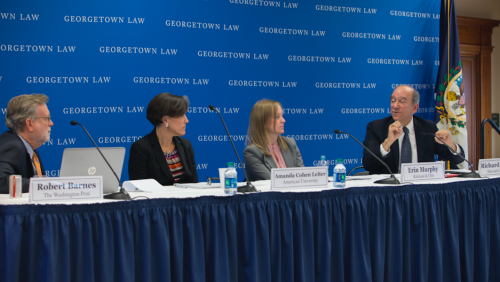Supreme Court May Alter Scope of Clean Water Act with Maui Case
January 13, 2020

Robert Barnes moderated a panel featuring American University Professor Amanda Cohen Leiter, Erin M. Murphy (L’06) of Kirkland & Eliis and Harvard Law Professor Richard Lazarus.
This term, the Supreme Court will decide its first major case on the Clean Water Act in over a decade.
That’s because the mayor of Maui County, Hawaii, thwarted his own county council’s last-minute decision to settle the case before the Court heard oral arguments in November.
Now the justices are left “wrestling with the scope” of the nation’s seminal water pollution control law, according to Georgetown Law’s Environmental Law and Policy Program Director Sara Colangelo.
Given the import of the case, and with at least 10 Georgetown Law alumni on the briefs, Colangelo, a graduate herself, had decided early last fall to organize a same-day panel discussion to analyze the oral arguments in Maui v. Hawai’i Wildlife Fund.
As the argument date approached, it was unclear if the case would settle off the docket. But the case proceeded when dueling letters to the Court from the Maui County mayor and city council undercut the claim that a settlement was in place.
On November 6th more than 100 people, including students, journalists and environmental law experts, came to hear the discussion in the Gewirz Student Center, just hours after the justices heard the case less than a mile from campus.
Colangelo (L’07) opened with a capsule summary of the case, in which the U.S. Court of Appeals for the Ninth Circuit affirmed that the county violated the Clean Water Act by discharging treated sewage from its Lahaina disposal wells into groundwater, from which it traveled to the Pacific Ocean.
There’s “no dispute” that disposal wells are a “point source” of pollution as defined in the law, Colangelo said; nor is there any dispute that pollutants from those wells are showing up in the ocean. The sole question before the high court is whether that intermediate step – the trip through groundwater – precludes application of the Clean Water Act.
A “good and lively argument”
From the “good and lively argument” that morning, it was clear the Supreme Court is “struggling” with the issue and the justices “haven’t quite made up their minds what they’re going to do,” said Robert Barnes, the Washington Post’s longtime Supreme Court correspondent.
Barnes moderated the discussion, which included American University Professor Amanda Cohen Leiter of the environmentalists’ legal team and Erin M. Murphy (L’06) of Kirkland & Ellis, who co-authored an amicus brief in support of the county. Murphy and Paul Clement (F’88) represent Kinder Morgan Energy Partners, which has asked the court to review a similar Clean Water Act decision by the 4th Circuit.
Rounding out the panel was Harvard Law Professor Richard Lazarus, co-founder of Georgetown Law’s Supreme Court Institute, who served as an independent voice.
Barnes asked all three the question he said he most dreads hearing from his editor: “Who’s gonna win?”
Leiter acknowledged the dangers of “reading the tea leaves” after a Supreme Court argument. However, she said she was “slightly reassured” by how many of the justices seemed to realize that automatically excluding pollution that travels through groundwater, as the county and the U.S. Environmental Protection Agency have urged, is “a recipe for evasion” of the Clean Water Act.
Potential impact on millions of homes
Murphy, though, said the justices “had real concerns” about the breadth of the Ninth Circuit’s holding that the Clean Water Act covers any pollution of navigable water if it is “fairly traceable” to a point source and “not de minimis.” That ruling has the potential to subject millions of home septic systems to federal regulation with fines of up to $50,000 per day, the county argued.
“What was very clear was that … they don’t like anybody’s test,” Murphy said. Her “general sense” was that the majority would lean toward the county’s arguments, but it was hard to “get the best read on where they are going to draw the line.”
Murphy and Lazarus each expect Justice Brett Kavanaugh to cast the deciding vote, but Lazarus is not entirely certain that it will be with the conservative justices.
“I came into this thinking the petitioners were going to win,” that the court “took the case to reverse it,” Lazarus said. After the oral argument, “I’m not saying they’re going to lose… but it’s not a sure thing.”
Lazarus said he presumed the mayor of Maui County refused to sign off on the County Council’s preferred settlement with Hawai’i Wildlife because the county’s attorneys at Hunton Andrews Kurth LLP also were confident of a win.
“If I were counsel at [Hunton], I would at least owe my client a phone call right now,” he said.